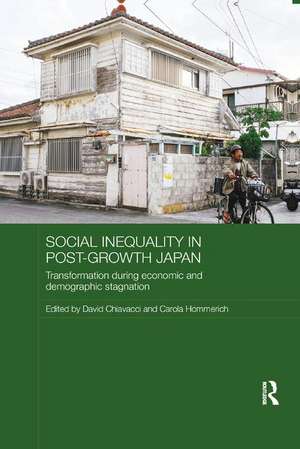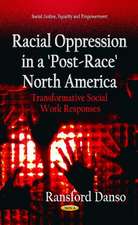Social Inequality in Post-Growth Japan: Transformation during Economic and Demographic Stagnation: Routledge Contemporary Japan Series
Editat de David Chiavacci, Carola Hommerichen Limba Engleză Paperback – 21 dec 2017
| Toate formatele și edițiile | Preț | Express |
|---|---|---|
| Paperback (1) | 364.17 lei 6-8 săpt. | |
| Taylor & Francis – 21 dec 2017 | 364.17 lei 6-8 săpt. | |
| Hardback (1) | 1058.65 lei 6-8 săpt. | |
| Taylor & Francis – 4 aug 2016 | 1058.65 lei 6-8 săpt. |
Din seria Routledge Contemporary Japan Series
-
 Preț: 311.18 lei
Preț: 311.18 lei - 8%
 Preț: 383.06 lei
Preț: 383.06 lei -
 Preț: 325.09 lei
Preț: 325.09 lei - 9%
 Preț: 934.96 lei
Preț: 934.96 lei -
 Preț: 348.51 lei
Preț: 348.51 lei -
 Preț: 340.61 lei
Preț: 340.61 lei -
 Preț: 327.41 lei
Preț: 327.41 lei -
 Preț: 309.55 lei
Preț: 309.55 lei -
 Preț: 309.93 lei
Preț: 309.93 lei -
 Preț: 202.94 lei
Preț: 202.94 lei -
 Preț: 310.99 lei
Preț: 310.99 lei -
 Preț: 663.95 lei
Preț: 663.95 lei - 14%
 Preț: 1002.06 lei
Preț: 1002.06 lei - 18%
 Preț: 1056.00 lei
Preț: 1056.00 lei - 18%
 Preț: 1061.93 lei
Preț: 1061.93 lei -
 Preț: 348.40 lei
Preț: 348.40 lei -
 Preț: 483.08 lei
Preț: 483.08 lei -
 Preț: 484.04 lei
Preț: 484.04 lei - 28%
 Preț: 820.32 lei
Preț: 820.32 lei - 23%
 Preț: 327.08 lei
Preț: 327.08 lei - 18%
 Preț: 1162.39 lei
Preț: 1162.39 lei - 18%
 Preț: 951.96 lei
Preț: 951.96 lei -
 Preț: 290.77 lei
Preț: 290.77 lei - 25%
 Preț: 823.99 lei
Preț: 823.99 lei - 18%
 Preț: 703.79 lei
Preț: 703.79 lei - 18%
 Preț: 1051.60 lei
Preț: 1051.60 lei - 18%
 Preț: 1059.84 lei
Preț: 1059.84 lei -
 Preț: 390.96 lei
Preț: 390.96 lei - 18%
 Preț: 1110.92 lei
Preț: 1110.92 lei - 18%
 Preț: 1220.42 lei
Preț: 1220.42 lei -
 Preț: 277.04 lei
Preț: 277.04 lei - 28%
 Preț: 791.43 lei
Preț: 791.43 lei -
 Preț: 447.51 lei
Preț: 447.51 lei -
 Preț: 487.44 lei
Preț: 487.44 lei -
 Preț: 328.95 lei
Preț: 328.95 lei - 18%
 Preț: 1113.95 lei
Preț: 1113.95 lei - 18%
 Preț: 1058.79 lei
Preț: 1058.79 lei - 24%
 Preț: 129.96 lei
Preț: 129.96 lei - 18%
 Preț: 1007.48 lei
Preț: 1007.48 lei - 28%
 Preț: 818.93 lei
Preț: 818.93 lei - 18%
 Preț: 1059.84 lei
Preț: 1059.84 lei -
 Preț: 386.30 lei
Preț: 386.30 lei - 18%
 Preț: 1056.95 lei
Preț: 1056.95 lei
Preț: 364.17 lei
Nou
Puncte Express: 546
Preț estimativ în valută:
69.69€ • 72.49$ • 57.54£
69.69€ • 72.49$ • 57.54£
Carte tipărită la comandă
Livrare economică 12-26 aprilie
Preluare comenzi: 021 569.72.76
Specificații
ISBN-13: 9780815356295
ISBN-10: 0815356293
Pagini: 320
Ilustrații: 18 Tables, black and white; 44 Line drawings, black and white; 17 Halftones, black and white; 61 Illustrations, black and white
Dimensiuni: 156 x 234 x 24 mm
Greutate: 0.45 kg
Ediția:1
Editura: Taylor & Francis
Colecția Routledge
Seria Routledge Contemporary Japan Series
Locul publicării:Oxford, United Kingdom
ISBN-10: 0815356293
Pagini: 320
Ilustrații: 18 Tables, black and white; 44 Line drawings, black and white; 17 Halftones, black and white; 61 Illustrations, black and white
Dimensiuni: 156 x 234 x 24 mm
Greutate: 0.45 kg
Ediția:1
Editura: Taylor & Francis
Colecția Routledge
Seria Routledge Contemporary Japan Series
Locul publicării:Oxford, United Kingdom
Cuprins
Introduction
- After the Banquet: Economic and Demographic Stagnation since the 1990s
- Creation of Inequality and Its Perception in Japan
- Institutions and Actors in the Creation of Social Inequality: A Rational Choice Approach to Social Inequality
- The Gap as Threat: Status Anxiety in the ‘Middle’)
- Labour Market and Employment System
- The "Re-segmentation" of the Japanese Labour Market: Investigating the Impact of Industrial Dynamics
- Does Employment Dualisation Lead to Political Polarisation? Assessing the Impact of Labour Market Inequalities on Political Discourse in Japan
- Are Labour Union Movements Capable of Solving the Problems of the ‘Gap Society’?
- Welfare State and Family
- Economic Inequality among Families with Small Children in Japan: Who Provides Welfare to Children?
- Social Policy Responses to the ‘Gap Society’: The Structural Limitations of the Japanese Welfare State and Related Official Discourses since the 1990s
- The Old and New Welfare Politics in Japan: Persisting Obstacles for Reform
- Education and Social Mobility
- Understanding Structural Changes in Inequality in Japanese Education: From Selection to Choice
- Political Discourse and Education Reforms concerning "Equality of Educational Opportunity"
- Trying to Reduce Inequalities in School: The Academic Discourse and the Concept of ‘Effective Schools’
- Urban-Rural Divide
- The Urban-Rural Divide in Japan: A Matter of Social Inequality?
- Public and Political Discourse on Socio-Spatial Inequality in Japan
- Understanding the Dynamics of Regional Growth and Shrinkage in 21st Century Japan: Towards the Achievement of an Asian-Pacific ‘Depopulation Dividend’
- New Immigration and Ethnic Minorities
- Migration and Integration Patterns of New Immigrants in Japan: Diverse Structures of Inequality
- The "Multicultural Coexistence" Discourse in Crisis? Public Discourse on Immigrant Integration in the Gap Society
- Understanding the Gaps Between Immigrant Economic Outcomes: Strategic Action and Meaning Making among Newcomer Immigrants in Japan
- Conclusion
- Reassembling the Pieces: The Big Picture of Inequality in Japan
Notă biografică
David Chiavacci is Mercator Professor of Social Science of Japan at the University of Zürich, Switzerland.
Carola Hommerich is Associate Professor of Sociology at Hokkaido University, Sapporo, Japan.
Carola Hommerich is Associate Professor of Sociology at Hokkaido University, Sapporo, Japan.
Descriere
In recent decades Japan has changed from a strongly growing, successful developing country with a high level of social equality to a country with a stagnating economy, a shrinking population and a very high proportion of elderly people. Within this, and especially since the crisis of 2007-09, new forms of inequality are emerging and deepening. These new forms of inequality are complex, are caused in different ways by a variety of factors, and require deep-seated reforms in order to remedy them. This book provides a comprehensive overview of inequality in contemporary Japan. It examines inequality in labour and employment, in welfare and family, in education and social mobility, in the urban-rural divide, and concerning immigration, ethnic minorities and gender. The book also considers the widespread anxiety effect of the fear of inequality; and discusses how far these developments in Japan represent a new form of social problem for the wider world.












